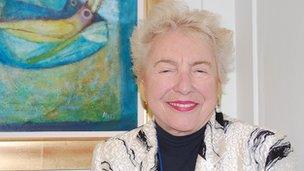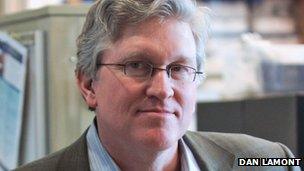What motivates philanthropists?
- Published
Dame Stephanie Shirley: "I've been given so much myself, what else can I do but give?"
From wartime child refugee to self-made multi-millionaire and philanthropist, Dame Stephanie Shirley's life has been more eventful than most.
She arrived in London at the age of five, just weeks before the outbreak of World War II - one of thousands of Jewish children fleeing the Nazis and coming to Britain as part of the Kindertransport - and was brought up by loving foster parents.
After starting out as a scientific civil servant, in 1962 she founded software company Freelance Programmers - later known as FI Group, later still Xansa - something which was almost unheard of for a woman to do in the 1960s.
Indeed she adopted the name Steve to help her in a male-dominated world.
The success of the company left Dame Stephanie with a fortune of about £150m, most of which she has donated to good causes.
"I know very clearly why I give. I've been given so much myself, what else can I do but give?" she says.
Driving force
But she also has a much more personal reason for her choice of where to give. Her late son Giles was profoundly autistic.

Dame Stephanie says her philanthropy keeps her so busy she does not feel like she is retired
"I started off with a very clear driving force - that I needed to provide for his future," she says.
She was an early member of the National Autistic Society and established the Shirley Foundation, which funds many projects, particularly related to autism.
One such project was to set up Prior's Court School in Thatcham, Berkshire, as an independent special school for students with autism.
While she is not as involved now as she was in its early days, Dame Stephanie takes great pride in the development of the school.
"We've had our first people graduate from the age of 16. We've now opened an adult learning centre, it's ever changing," she says.
Problem-solving skills
The desire by the super-rich to create some kind of social impact is not a new phenomenon, according to Jen Shang, philanthropic psychologist at Indiana University and the University of Bristol.

The Shirley Foundation bought the Prior's Court estate in 1998; the school opened the following year
What is new, she says, is how they care about the creation of that social impact: "A lot of the people who accumulated their own wealth instead of inherited it have been quite successful in the first half of their life.
"Then what they decided is they see something they really want to solve, and they use identical sets of problem-solving skills that they know they're good at and apply that to their philanthropy."
But it is not always so straightforward.
"They've self-trained," says Dr Shang. "Often what they find is the philanthropy is more challenging than their business interests."
Business impact
Jeff Raikes is a former senior executive at Microsoft. Since retiring in 2008, he has become chief executive of the Gates Foundation, as well as setting up his own foundation with his wife Tricia.
He cites three main influences on his reasons for going into philanthropy. The first two are his parents, and the investor and philanthropist Warren Buffett, whom he and his wife met in the early 1990s.
The third is the experience his daughter Michaela had, going through some challenges in school, that he felt showed there needed to be some new thinking about the transitions children go through.

Mr Raikes says philanthropy would benefit from having a wide range of views
As a result, one of the schemes the Raikes Foundation supports is The Middle Shift Initiative, which aims to help 10 to 14-year-olds to build the mindsets and learning strategies to succeed in later education and work.
His business background certainly had an impact on his philanthropy.
Growing up on a farm in Nebraska, he learnt about "discipline and execution", while at Microsoft he learnt about "strategy and vision", four elements which he says are important in both business and philanthropy.
Hard problems
But that didn't mean that there were no surprises in store.
"I didn't really think that there was competition in philanthropy," he admits.
"There's not competitors in philanthropy but there are people who you might think of as opponents or who have a different point of view."
While he may not have expected this, he says having a range of views benefits philanthropy.
"We are working on very, very hard problems. The aspiration is so big and the solution is so ambiguous," he says.
"It's extremely important to recognise there are different points of view... to improve all philanthropic work."
Joy of giving
Dr Shang says what surprises her about the extremely wealthy is the excitement and joy they get out of their giving.
"I understand the warm and fuzzy feeling, but the excitement is something else," she says.
"If you hear them talking it's almost like they are talking about anything else that is their pet project."
As Dame Stephanie says: "To me giving is a lot of fun. It's not a question of compassion, it is a question of joy.
"I have a wonderful time, much nicer than when I was just spending money. I certainly think I get back much more than I give - [in terms of] pleasure, quality of life, friendships, fulfilment."